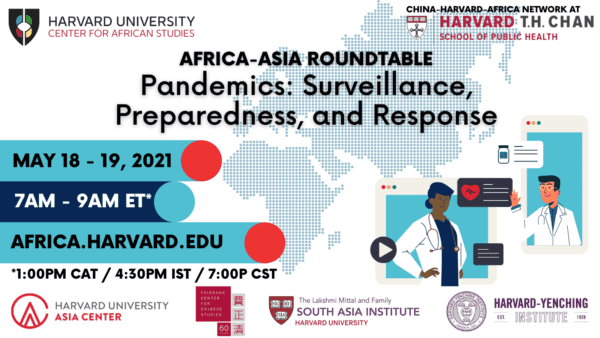Register here for the talk
The Harvard Center for Africa Studies will convene our Africa-Asia Roundtable – Pandemics: Surveillance, Preparedness, and Response on May 18 – 19, 2021 from 7:00a – 9:00a EST / 1:00p – 3:00p CAT / 4:30p – 6:30p IST / 7:00p – 9:00p CST.
The outbreak of the COVID-19 pandemic has brought a global focus on pandemic surveillance, preparedness, and response. As a result of the 2014 – 2016 Ebola outbreak, the World Bank invested in the Regional Disease Surveillance Systems Enhancement (REDISSE) Program. Thirteen countries in West and Central Africa have received a $200 million funding commitment “to prevent, detect, and respond to the threat of emerging and epidemic-prone diseases.” In addition to funding, the program has provided for intra-country cooperation on detecting and preventing pandemics as well as regional lab networks and training opportunities. More recently, the Africa CDC has spearheaded continental efforts to advance various elements of detection and response to various health threats, with notable success related to COVID-19. Such programs are examples of how regional and global cooperation designed to respond to an infectious disease outbreak can be leveraged in future pandemics.
China has promised the delivery of its Sinopharm vaccine to countries in Africa, with 200,000 doses arriving in Senegal and another 200,000 in Zimbabwe. While the commitments fall far short of the 1.4 billion doses that will be needed to reach herd immunity in Africa, China’s vaccine distribution has moved alongside the WHO-endorsed COVAX plan (to which China will also contribute 10 million vaccines). India has also been a contributor to global vaccine distribution, both through COVAX and other direct supplies to the global south, distributing more than 60 million doses. The scrambling for vaccines from the global north highlights a disparity in equitable access to vaccines, raising questions about intellectual property and the possibilities for local production.
Over two days, we will convene four panels to further explore questions around vaccines and vaccine development, technology transfer, capacity building, and global cooperation strategies for combating pandemics. What lessons can the world learn from Africa’s response to previous epidemics/pandemics including Ebola and HIV/AIDS and the current COVID-19 pandemic? What is the role of global cooperation between Africa-Asia, and China-India-Africa in particular? Is the COVID-19 crisis and response, including vaccine development and distribution, an opportunity for a new era of global cooperation?

